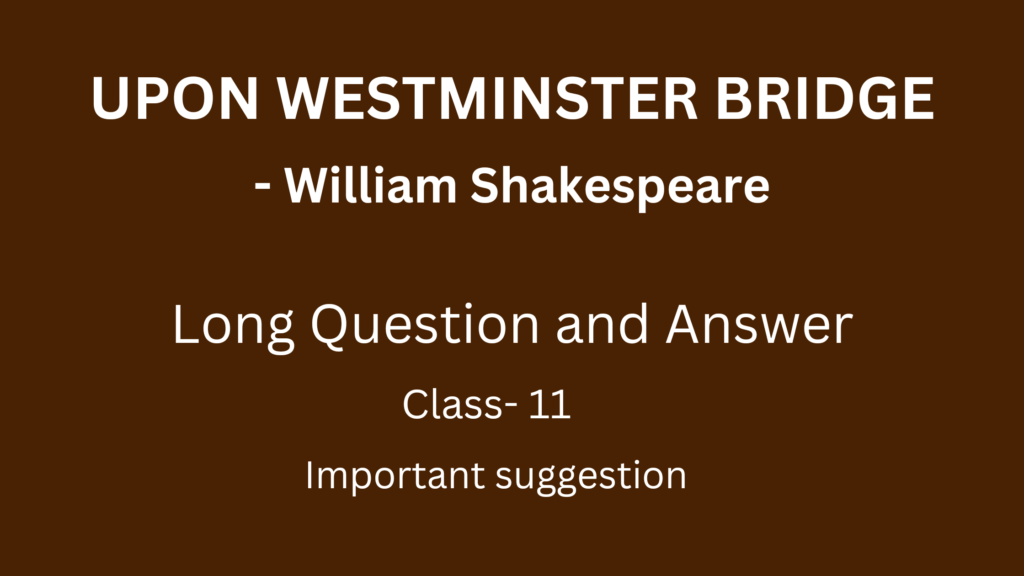
Broad Questions and Answers, Class- 11
Important suggestion:
DS type Questions (within 100 words):
Each Question mark – 5
UPON WESTMINSTER BRIDGE
– William Wordsworth
1) How does the sight touch the poet’s heart in its majesty?
Or,
How was the poet moved by the sight of London from the Westminster Bridge?
Ans- The poet sees the sight of a majestic morning in the city of London. The city looks splendid in the melted light of the golden sun. Clear is the air. Bare is the atmosphere. Ships and towers, domes and theatres lie open unto the vaster vista of a sunbathed earth in the morning. The beauty of the grand city creates a sense of awe in the mind of the poet. Now the poet perceives profound silence all over the city. He hears the sweet murmur of the river below the bridge. He relishes a sweet sensation in the all-pervading calm that surrounds the sleeping houses. In fact, the city with its majestic beauty and calm gives the poet infinite joy and soothes his soul.
2) How does the poet describe the city of London?
Ans- The poet sights the city of London on a sunlit morning. He is deeply impressed by the grand sight the city unfolds before him. It seems to him that the city wears the garment of the beauty of the sunny morning. He finds the ship’s, towers, domes, theaters and temples lying open unto the green fields at a distance. They seem to merge and mingle with the horizon. The poet is simply enthralled by the first splendor of the rising sun. He also feels a sweet silence in the calm face of nature in the city. It seems that the whole city enjoys an unbroken sleep.
3) What is the poet’s attitude to nature revealed in the poem Upon Westminster Bridge?
Ans- Upon Westminster Bridge – celebrates the poet’s ardent love of nature. Wordsworth loves and worships nature. He always seeks the calm contented face of nature. The lovely objects of nature stir his mind and soul. The poem in question testifies the truth. On a glorious sunlit morning he sights an unusual scene in the city. This is not the nature of hills and rocks or streams and valleys. This is a city. But it receives the bountiful gifts of benign nature. It comes in the shape of lustrous light of the glittering sun. The city is blessed with a glorious sunrise. The poet also feels a perfect silence there. As a lover of solitude he enjoys it to his heart’s content.
4) “Dull would he be of soul who would pass by…” – Who would he be dull and why?
Ans- The poet has a clear vision of the city of London at dawn. He feels that Earth does nothing more fair to show. Such a splendid sight can’t be ignored. For it is a thing of beauty which is a joy forever. Even a casual onlooker can’t overlook this scene. If there is any, he must be a man of no aesthetic sense. He must be unfeeling. In fact, the person who cares not to enjoy the sight of a lovely city bathed in the glitter and glow of the rising sun, lacks sense of beauty. Such a person is bound to be called dull.
5) Give the central idea of the poem Upon Westminster Bridge.
Ans- William Wordsworth sees the city of London from Westminster Bridge. It is morning. The sun is just set up. It illumes the city with its golden light. The splendid scene charms the mind of the poet. He breathes in smokeless air. All the tall structures of the city stand still. They meet and mingle with the distance horizon. They lose themselves amid the green valley. The poet enjoys a deep calm. It soothes his mind. It stirs his whole being. He feels that the mighty city is, as if, lulled to profound slumber.
6) “This city now doth like a garment wear/ The beauty of the morning;” – Explain the comparison the lines contain.
Ans- The above lines contain a fine comparison. It is by nature a simile. The poet here compares the city to a lovely lady. A lovely lady wears a nice dress. It adds loveliness to her and enhances her attraction. So is the case with the city. The golden glow of the sun is like a gorgeous apparel. The city seems to put on the beauty of the morning. It adorns the city and make it more attractive. The comparison is explicit. The word like makes it clear. In fact, the city is invested with an unearthly beauty. The sunny morning creates all the charm for it.
7) The poet uses words like silent, bare and calm in order to describe London. How does this atmosphere give the city a special character?
Ans- The poet uses words like silent, bare and calm to describe the city of London. The poet sees the city in the early morning. The city is then fully silent. The church is not opened. The domes are free from noise. No man is found near the theatre. The streets are deserted. The factory work is yet to begin. No ship is found sailing in the river Thames. The visibility is clear. Smoke and dust, smog and fog do not obstruct the vision. All the great buildings of the city are clearly visible. They standstill, bare and calm. In fact, the silence, stillness and bareness of the day capture the mind of the poet.